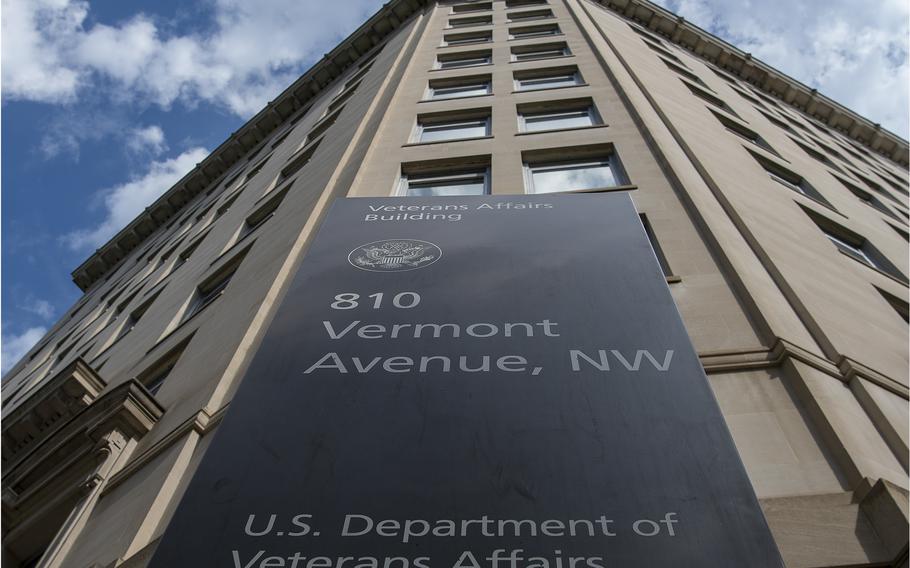
The Department of Veterans Affairs headquarters building as seen in Washington, D.C., on July 6, 2022. (Carlos Bongioanni/Stars and Stripes)
WASHINGTON – The Department of Veterans Affairs is planning to use AI-assisted weapon detectors at several unidentified agency medical centers to scan patients, visitors and staff without having them stop, empty their pockets and pass through metal detectors, a House lawmaker revealed Thursday.
“While I support improving safety and security at VA facilities, I am concerned this is the first time we are hearing about this pilot [program]. To my knowledge, the VA has not yet brought veterans along with this change either,” Rep. Frank Mrvan, D-Ind., said during a hearing of the House Veterans’ Affairs Committee’s subpanel on oversight and investigations.
Security challenges at VA health facilities were part of the discussion at the hearing that addressed chronic vacancies and high turnover of VA police officers at 172 agency medical centers and more than 1,000 health clinics.
Mrvan said veterans need to be informed about the plan to test the new weapon detection system driven by artificial intelligence that would operate continuously and unnoticed at VA medical facilities. He urged the VA to work with veterans services officials to inform veterans about the pilot program and get their feedback.
“I believe these proposals must be driven by veterans so that veterans feel they can access their care with ease,” he said.
Jon Retzer, assistant national legislative director for the Disabled American Veterans, said his organization supports standardizing security practices at VA health facilities.
Unlocked doors, lack of police and inoperable security cameras are problems at many hospitals and clinics, he said.
But veterans also have questions about how the proposed high-tech weapon detection system would work, including how it might affect veterans who use pacemakers, wheelchairs and other medical devices, Retzer said.
“Veterans want to share their concerns about the potential impact of new screening measures,” he said.
The VA published a request for information to federal contractors in March for acquiring weapon detection systems to operate under a five-year contract at VA health facilities.
“The purchase will be to enhance the facilities security posture by using artificial intelligence in order to screen people coming into the building,” according to the contract notice.
The technology under consideration would have the capability to screen up to 4,000 people per hour within a health-care setting without requiring visitors and staff to pass through a conventional metal detector.
At the hearing, Alfred Montoya, the deputy assistant undersecretary for health for operations at the VA, did not directly address the VA’s plans for installing and testing the new weapon detectors at facilities.
He only said the VA’s strategy for improving security involves enhancing capabilities by investing in technology and improving retention among VA police officers.
“We strive for open secure facilities while balancing visitor access, threat, policies and standards,” Montoya said.
He said pay for VA police officers does not align with industry standards.
“One common challenge is ensuring that compensation is competitive enough to attract and retain qualified personnel. Additionally, there may be discrepancies between federal agencies or regions, leading to retention issues in certain areas,” Montoya said.
Rep. Morgan Luttrell, R-Texas, raised concerns during the hearing about police interactions at VA health facilities with veterans who are perceived to have behavior problems.
Luttrell asked VA officials about red flag alerts placed in the medical records of veterans determined to pose a threat to the safety of patients, visitors and medical staff at VA facilities.
“I get a lot of feedback from veterans about red flag laws. Once they are hung, they are never unhung,” he said.
Luttrell said when red flag alerts are placed in the files of veterans, it affects their interactions with medical personnel.
Montoya said there are “disruptive behavior committees” at VA medical facilities that meet to review the red flag alerts in veterans’ files.
Luttrell and other lawmakers also highlighted a recent report from the Government Accountability Office that stated only one-third of the VA’s 4,500 police officers have completed mandated suicide prevention training.
The VA also lacks a comprehensive security strategy, the report found.
“Suicide prevention training is paramount for all police officers and is required by law, but data shows that it has so far not been a priority of the department,” said Rep. Jen Kiggans, R-Va., chairwoman of the House subpanel.